8 False Claims 60 Minutes Made About Probiotics
When “experts” misrepresent the science.

A recent 60 Minutes segment titled Do Probiotics Actually Do Anything? made 8 claims about probiotics, using the interviews of various experts. All but one of them was false.
High Quality Data About Probiotics
Dr. Patricia Hibberd claimed “There’s not enough high-quality research to recommend off-the-shelf probiotics for the medical problems for which they’re commonly used”, and “There’s a lot of conflict among scientists about whether probiotics provide any benefit at all.”
Certainly, I wouldn’t say that probiotics are a panacea, and I agree there is a need for more research to confirm the trends that have emerged from the research.
However, there is ample evidence from meta-analyses and systematic reviews that compile the results of numerous clinical trials showing probiotics are a safe and effective treatment for various conditions. There’s a widely-accepted hierarchy of research quality, as shown in this pyramid diagram:

The difference between these levels of evidence is similar to the way restaurants are reviewed. You could ask one person’s opinion about a restaurant, but they may have been there on a particularly bad night. If you ask a group of friends, you might get a few different opinions. If you look online, you might find hundreds of reviews and now you can see overall trends and an average score.
The highest levels of evidence are summaries of multiple studies. These include:
- Systematic Reviews – A review of all the available research data on a given topic.
- Meta-Analyses – A review of all the available research which evaluates all the data together to show overall trends.
Both of these types of studies protect against cherry-picking and bias, and are considered the gold standard of research. If their results are positive, they are the equivalent of a 4 or 5 star review of a restaurant on Yelp! or Google.
High-Level Evidence Clearly Shows the Benefits of Probiotics
According to the research, there is high-level scientific support showing that conditions such as Irritable Bowel Syndrome (IBS), Inflammatory Bowel Disease (IBD), mood disorders (such as depression), and gut infections respond well to probiotics.
There is also limited, but encouraging scientific support showing probiotics can benefit brain function, hormones, seasonal allergies, autoimmune conditions, and sleep.
There may not be agreement among all scientists, but to characterize these results as inconsequential is entirely inaccurate.
Let’s review specific data about the claims 60 Minutes and their guests made during the segment.

Probiotics Don’t Reduce Antibiotic-Associated Diarrhea
When asked if there was any evidence that probiotics help antibiotic associated diarrhea, Dr. Patricia Hibberd unequivocally said, “No.” Evidence suggests she is wrong.
The Journal of the American Medical Association published a meta-analysis of 82 randomized-control trials on antibiotic associated diarrhea. The study included trials of several different types of probiotics and concluded:
“The pooled evidence suggests that probiotics are associated with a reduction in Antibiotic Associated Diarrhea.” [1]


That’s one review, but is there a chance that this is a selective citation? Nope. Here are two additional meta-analyses confirming the same result:
- A systematic review and meta-analysis of 17 randomized controlled trials pooling 3631 participants found that subjects using probiotics had half the rate of antibiotic associated diarrhea compared to controls. [2]
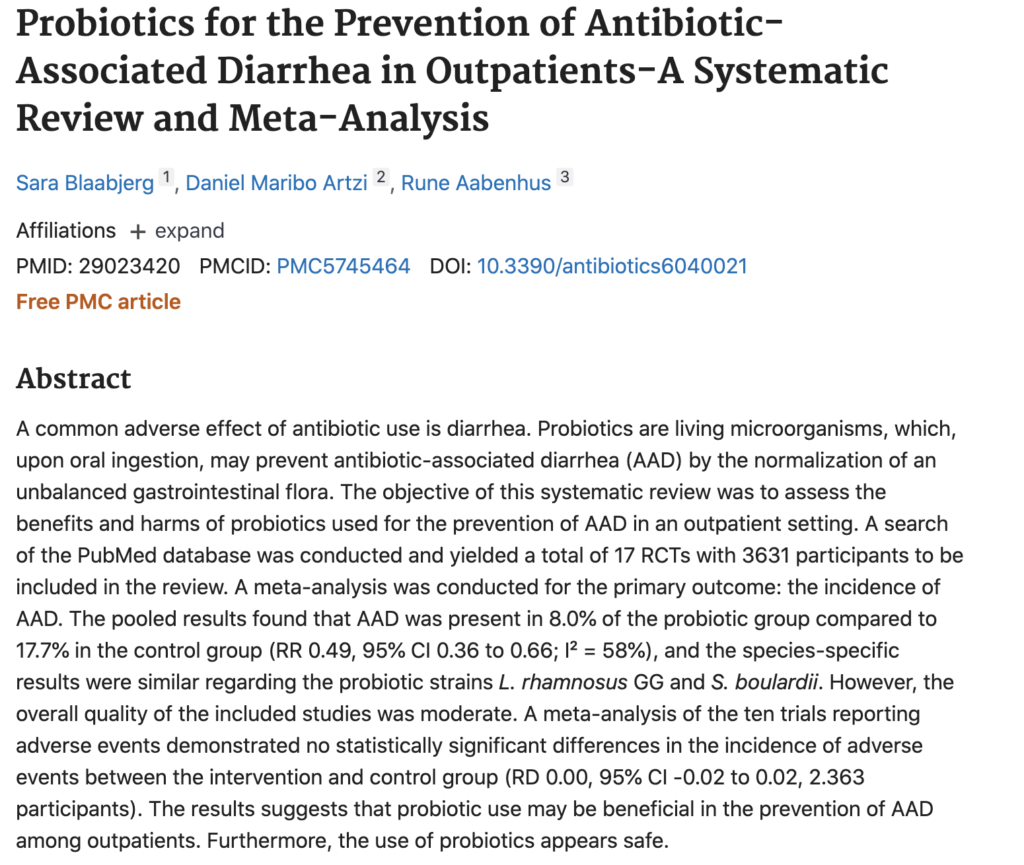

- A systematic review and meta-analysis of 51 randomized controlled trials pooling 9569 participants concluded: “Lactobacillus rhamnosus GG (LGG) had the highest probability of being ranked best both in effectiveness and tolerance on prevention of AAD.” [3]
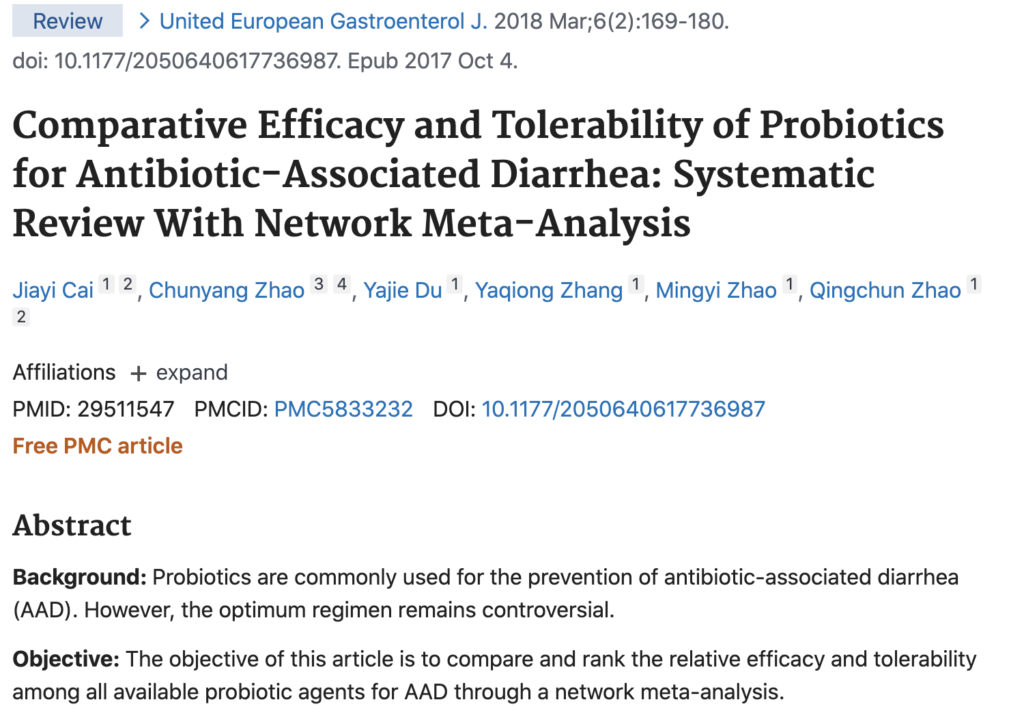

These data may not suggest that everyone will prevent or avoid antibiotic associated diarrhea if they use probiotics, but the evidence clearly suggests that probiotics at least reduce the incidence of antibiotics associated diarrhea. Stating otherwise is not an accurate statement.

Probiotics Don’t Help Irritable Bowel Syndrome (IBS)
When asked if there was any evidence that probiotics could be used to treat irritable bowel syndrome (IBS), Dr. Hibberd also said, “No.” This surprised me because there is very good evidence – both meta-analyses and clinical trials – that show people with IBS benefit from probiotics.

- Two meta-analyses have shown probiotics to be an effective treatment for IBS, with no side effects. [4] [5]
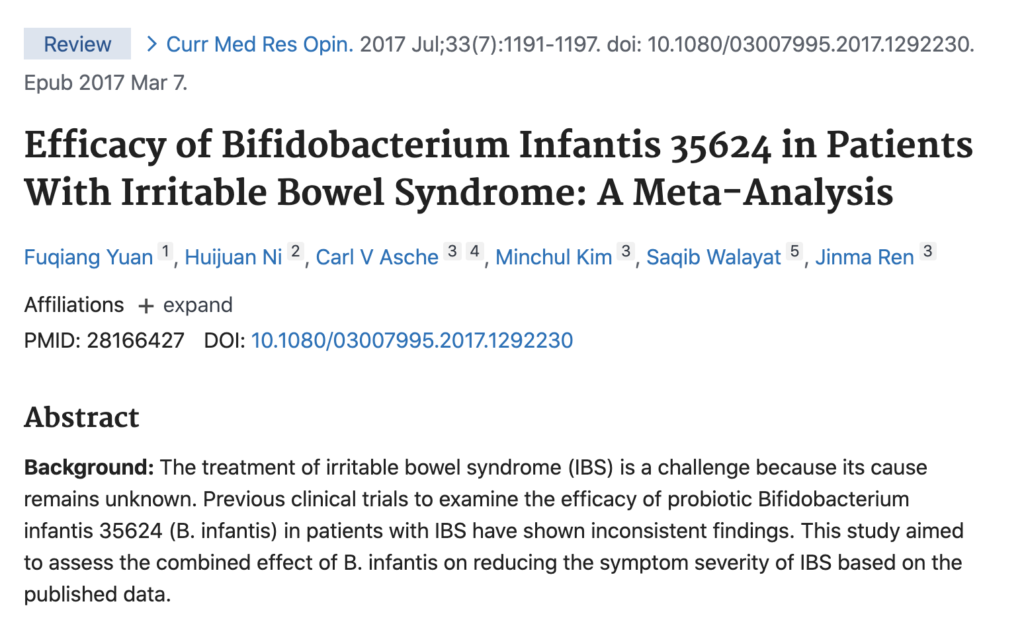

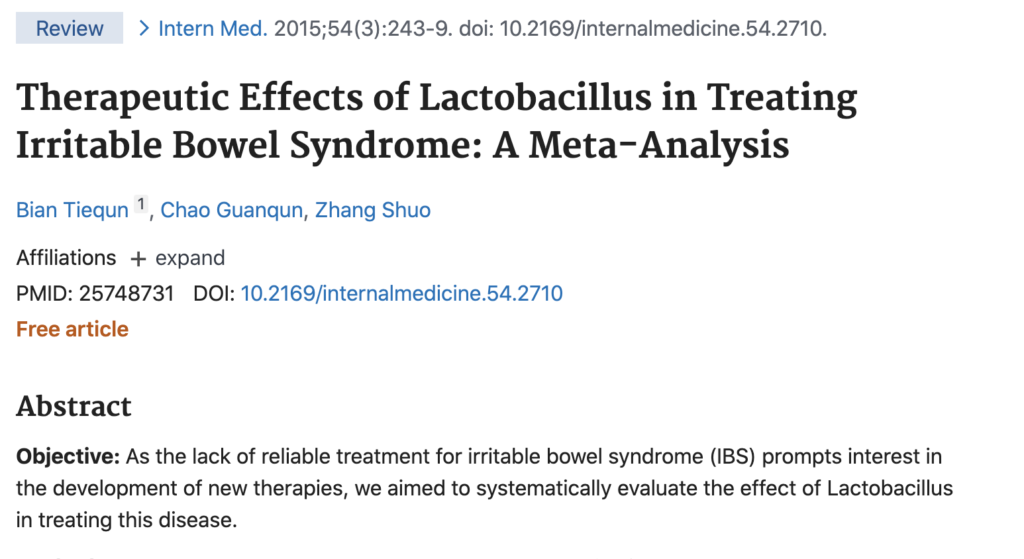

- In another meta-analysis, the results of 20 placebo-controlled clinical trials were reviewed, including a total of 1,404 subjects. The probiotic group showed improvement in global IBS symptoms when compared to the placebo group. [6] This includes improvements in:
- Constipation, diarrhea, and/or loose stools
- Abdominal pain
- Bloating
- Flatulence
- Food intolerance
- Fatigue and Difficulty sleeping
These three meta-analyses share the results of a total of 33 clinical trials, which collectively suggest probiotics are beneficial for treating IBS.
While I can appreciate someone like Dr. Hibberd being circumspect regarding probiotics, her statement could lead those suffering with IBS to avoid probiotics which have been demonstrated to alleviate this suffering and ostensibly improve quality of life, reduce days of missed work, etc…

Probiotics Don’t Help Allergies
Dr. Hibberd also claimed there was no evidence that probiotics have been shown to be beneficial for allergies. There isn’t as much evidence here as for IBS, but there is still some very promising data.
- A meta-analysis of 22 randomized control trials concluded that probiotics can significantly improve seasonal allergies. [7] The results claimed: “Despite high variability among the studies, synthesis of available data provided significant evidence of beneficial clinical and immunologic effects of probiotics in the treatment of allergic rhinitis.” Another high-quality study supports this same finding. [8]
- There is also data, albeit mixed, suggesting that probiotic supplements given to children may prevent or reduce the formation of allergies. [9]

The Effects of Probiotics are Due to the Placebo Effect
Meta-analyses and systematic reviews typically only include randomized and placebo-controlled trials. The design of these randomized, double-blind trials protects against placebo effect and other researcher bias. If a randomized, double-blind study concludes that a probiotic intervention performed better than a placebo, then there is likely true benefit to that intervention.

Probiotics Don’t Colonize the Gut
It’s widely accepted and known that most probiotics don’t colonize the gut. The exception to this are the soil-based probiotics. [10]
The 60 Minutes segment highlighted this fact with the apparent intention to suggest that because probiotics don’t colonize the gut, they don’t have benefits. Despite the fact that most probiotics don’t colonize the gut, they still have beneficial effects on the immune and inflammatory balance in the gut.

Probiotics Shouldn’t Be Taken With Antibiotics
Doctors Eran Elinav and Eran Segal shared the results of their study in the 60 Minutes segment that showed people who used probiotics with antibiotics took longer for their microbiome to return to normal after the course of antibiotics. [11] While this is an interesting study result, and is pause for concern, it’s also just one small study among a larger field of meta-analyses and systematic reviews.
There are a lot of data showing that using probiotics during antibiotic therapy leads to better outcomes and fewer side effects during treatment.
Consider:
- A systematic review of 20,215 patients with H. pylori infections showed that patients who took probiotics and antibiotics together had better results than patients who only took antibiotics. [12]
- A systematic review of 63 clinical trials found that in healthy subjects who experienced a disturbance in their microbiota after antibiotic use, 83% of subjects experienced recovery in their microbiota after taking probiotics. [13]
- There is also research to show that probiotics and antibiotics are more effective together for SIBO and other gut infections:
- One study of 40 patients with SIBO showed more than double the success rate in those taking a combination of S. Boulardii and metronidazole (an antibiotic) when compared to those taking metronidazole alone. [14]
- Another study showed a combination of probiotic and antibiotic therapy normalized glucose breath tests for 13 out of 15 patients with both SIBO and Crohn’s disease. [15]
Though more study needs to be done, we do have reasonable evidence to suggest that using probiotics with antibiotics improves their effectiveness, and reduces their side effects. There is also the data suggesting that probiotics reduce antibiotic-associated diarrhea (see above).
Sadly, 60 Minutes appears guilty of cherry-picking one, small and less significant study and overlooking the wealth of higher-quality data, thus misleading the viewer.

Probiotics May Not Be Safe for Infants and Babies
It’s understandable that we want to make sure that what we give to babies, infants, and children is safe. However, to claim that just because there are no long-term studies demonstrating their safety we shouldn’t use them, disregards the proven benefits of probiotics for infants and babies.

For example, researchers have found the following benefits from probiotic use for babies: [16]
- Less colic and irritability
- Less diarrhea
- Fewer spitting episodes
- Fewer respiratory infections
More studies show that probiotics:
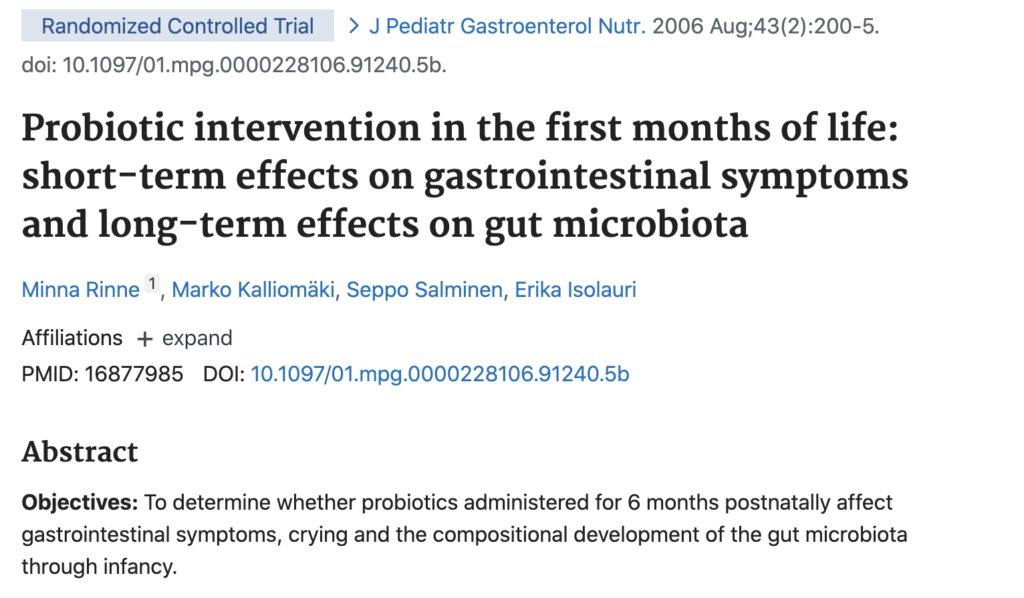

- Protect infants against intestinal fungus (candida) overgrowth [19]
- Reduce the risk of ear and respiratory infection in babies [20]
In fact, because many babies are born today by C-section, they miss getting the inoculation dose of their mother’s probiotic bacteria. [21] C-section babies are at greater risk for health conditions like asthma, allergies, reduced bacterial diversity, and future obesity. [22] [23]
Though probiotic supplements will never live up to the diversity and complexity of the mother’s native microbiome, giving C-section babies probiotics may help protect against some of these long-term health consequences.
Overall, again I would argue that 60 Minutes’ claims stand to pose more detriment than benefit for the viewer.

Probiotics Haven’t Been Shown to Be Safe
Dr. Frank Greer claimed on 60 Minutes that there are no long-term studies to show that probiotics are safe. While it’s true that there aren’t long-term studies, there is a general consensus that probiotics are considered safe in most cases.
The National Institutes of Health [24] states that probiotics are generally safe, even for premature infants. To quote:
“Given the large quantities of probiotics consumed around the world, the numbers of opportunistic infections that result from currently marketed probiotics are negligible. For example, probiotics have been administered to thousands of newborn infants, including some who were premature, without a single case of sepsis.”
There does appear to be some risk for immune-compromised patients, as 60 Minutes states, but there is still room for interpretation of this opinion.
The journal Expert Opinions on Drug Safety recommends the following: [25]
“Critically ill patients in intensive care units, critically sick infants, postoperative and hospitalized patients and patients with immune-compromised complexity were the most at-risk populations.”
“While the overwhelming existing evidence suggests that probiotics are safe, complete consideration of risk-benefit ratio before prescribing is recommended.”
When it comes to immune-compromised individuals, recent research suggests that probiotics may actually be safe and beneficial.
An analysis of 57 clinical studies indicates that probiotic and/or synbiotic administration in immune-compromised adults is safe with regard to the current evaluated probiotic strains, dosages, and duration. There were no major safety concerns in the study, and overall, adverse events actually occurred less frequently in immune-compromised subjects receiving probiotics compared to the control group. [26]
That said, I will agree with 60 Minutes about regulation of probiotics. There is little Food and Drug Administration (FDA) oversight of probiotics products on the shelves, and many products do not contain what they claim. For example, one study of 5 brands of soil-based probiotics showed only one brand matched its label claims. [27]
But given the potential and proven health benefits of probiotics, this shouldn’t be an argument against using probiotics, but rather an argument against using low-quality, unvetted products. Choose probiotics that are verified by third-party testing, and have clear label-claims and an expiration date.
The Bottom Line
Contrary to the claims promoted by 60 Minutes and their guests, probiotics have ample evidence and clinical data to support their use for IBS, antibiotic-associated diarrhea, infants and babies, allergies, and during antibiotic therapy. They are generally recognized as safe, and have benefits beyond the placebo effect, despite the fact that most of them don’t colonize the GI tract.
Consumers should be cautious to purchase probiotics from reputable sources and not to look at them as a panacea or a replacement for medical care.
In summary, I fear their recommendations will pose more harm than good for consumers by misleading them away from a safe and natural therapeutic.
Dr. Michael Ruscio is a DC, natural health provider, researcher, and clinician. He serves as an Adjunct Professor at the University of Bridgeport and has published numerous papers in scientific journals as well as the book Healthy Gut, Healthy You. He also founded the Ruscio Institute of Functional Health, where he helps patients with a wide range of GI conditions and serves as the Head of Research.➕ References
- Hempel S, Newberry SJ, Maher AR, et al. Probiotics for the prevention and treatment of antibiotic-associated diarrhea: a systematic review and meta-analysis. JAMA. 2012;307(18):1959-1969. doi:10.1001/jama.2012.3507
- Blaabjerg S, Artzi DM, Aabenhus R. Probiotics for the Prevention of Antibiotic-Associated Diarrhea in Outpatients-A Systematic Review and Meta-Analysis. Antibiotics (Basel). 2017;6(4):21. Published 2017 Oct 12. doi:10.3390/antibiotics6040021
- Cai J, Zhao C, Du Y, Zhang Y, Zhao M, Zhao Q. Comparative efficacy and tolerability of probiotics for antibiotic-associated diarrhea: Systematic review with network meta-analysis. United European Gastroenterol J. 2018;6(2):169-180. doi:10.1177/2050640617736987
- Yuan F, Ni H, Asche CV, Kim M, Walayat S, Ren J. Efficacy of Bifidobacterium infantis 35624 in patients with irritable bowel syndrome: a meta-analysis. Curr Med Res Opin. 2017;33(7):1191-1197. doi:10.1080/03007995.2017.1292230
- Tiequn B, Guanqun C, Shuo Z. Therapeutic effects of Lactobacillus in treating irritable bowel syndrome: a meta-analysis. Intern Med. 2015;54(3):243-249. doi:10.2169/internalmedicine.54.2710
- McFarland LV, Dublin S. Meta-analysis of probiotics for the treatment of irritable bowel syndrome. World J Gastroenterol. 2008;14(17):2650-2661. doi:10.3748/wjg.14.2650
- Güvenç IA, Muluk NB, Mutlu FŞ, et al. Do probiotics have a role in the treatment of allergic rhinitis? A comprehensive systematic review and meta-analysis. Am J Rhinol Allergy. 2016;30(5):157-175. doi:10.2500/ajra.2016.30.4354
- Dennis-Wall JC, Culpepper T, Nieves C Jr, et al. Probiotics (Lactobacillus gasseri KS-13, Bifidobacterium bifidum G9-1, and Bifidobacterium longum MM-2) improve rhinoconjunctivitis-specific quality of life in individuals with seasonal allergies: a double-blind, placebo-controlled, randomized trial. Am J Clin Nutr. 2017;105(3):758-767. doi:10.3945/ajcn.116.140012
- Wang HT, Anvari S, Anagnostou K. The Role of Probiotics in Preventing Allergic Disease. Children (Basel). 2019;6(2):24. Published 2019 Feb 5. doi:10.3390/children6020024
- Ilinskaya ON, Ulyanova VV, Yarullina DR, Gataullin IG. Secretome of Intestinal Bacilli: A Natural Guard against Pathologies. Front Microbiol. 2017;8:1666. Published 2017 Sep 1. doi:10.3389/fmicb.2017.01666
- Suez J, Zmora N, Zilberman-Schapira G, et al. Post-Antibiotic Gut Mucosal Microbiome Reconstitution Is Impaired by Probiotics and Improved by Autologous FMT. Cell. 2018;174(6):1406-1423.e16. doi:10.1016/j.cell.2018.08.047
- Wang F, Feng J, Chen P, et al. Probiotics in Helicobacter pylori eradication therapy: Systematic review and network meta-analysis. Clin Res Hepatol Gastroenterol. 2017;41(4):466-475. doi:10.1016/j.clinre.2017.04.004
- McFarland LV. Use of probiotics to correct dysbiosis of normal microbiota following disease or disruptive events: a systematic review. BMJ Open. 2014;4(8):e005047. Published 2014 Aug 25. doi:10.1136/bmjopen-2014-005047
- García-Collinot G, Madrigal-Santillán EO, Martínez-Bencomo MA, et al. Effectiveness of Saccharomyces boulardii and Metronidazole for Small Intestinal Bacterial Overgrowth in Systemic Sclerosis. Dig Dis Sci. 2020;65(4):1134-1143. doi:10.1007/s10620-019-05830-0
- Greco A, Caviglia GP, Brignolo P, et al. Glucose breath test and Crohn’s disease: Diagnosis of small intestinal bacterial overgrowth and evaluation of therapeutic response. Scand J Gastroenterol. 2015;50(11):1376-1381. doi:10.3109/00365521.2015.1050691
- Skórka A, Pieścik-Lech M, Kołodziej M, Szajewska H. To add or not to add probiotics to infant formulae? An updated systematic review. Benef Microbes. 2017;8(5):717-725. doi:10.3920/BM2016.0233
- Rinne M, Kalliomäki M, Salminen S, Isolauri E. Probiotic intervention in the first months of life: short-term effects on gastrointestinal symptoms and long-term effects on gut microbiota. J Pediatr Gastroenterol Nutr. 2006;43(2):200-205. doi:10.1097/01.mpg.0000228106.91240.5b
- Rougé C, Piloquet H, Butel MJ, et al. Oral supplementation with probiotics in very-low-birth-weight preterm infants: a randomized, double-blind, placebo-controlled trial. Am J Clin Nutr. 2009;89(6):1828-1835. doi:10.3945/ajcn.2008.26919
- Manzoni P, Mostert M, Leonessa ML, et al. Oral supplementation with Lactobacillus casei subspecies rhamnosus prevents enteric colonization by Candida species in preterm neonates: a randomized study. Clin Infect Dis. 2006;42(12):1735-1742. doi:10.1086/504324
- Rautava S, Salminen S, Isolauri E. Specific probiotics in reducing the risk of acute infections in infancy–a randomised, double-blind, placebo-controlled study. Br J Nutr. 2009;101(11):1722-1726. doi:10.1017/S0007114508116282
- Rutayisire E, Huang K, Liu Y, Tao F. The mode of delivery affects the diversity and colonization pattern of the gut microbiota during the first year of infants’ life: a systematic review. BMC Gastroenterol. 2016;16(1):86. Published 2016 Jul 30. doi:10.1186/s12876-016-0498-0
- Sandall J, Tribe RM, Avery L, et al. Short-term and long-term effects of caesarean section on the health of women and children. Lancet. 2018;392(10155):1349-1357. doi:10.1016/S0140-6736(18)31930-5
- Arboleya S, Suárez M, Fernández N, et al. C-section and the Neonatal Gut Microbiome Acquisition: Consequences for Future Health. Ann Nutr Metab. 2018;73 Suppl 3:17-23. doi:10.1159/000490843
- Office of Dietary Supplements – Probiotics. (n.d.). https://ods.od.nih.gov/factsheets/Probiotics-HealthProfessional/
- Didari T, Solki S, Mozaffari S, Nikfar S, Abdollahi M. A systematic review of the safety of probiotics. Expert Opin Drug Saf. 2014;13(2):227-239. doi:10.1517/14740338.2014.872627
- Van den Nieuwboer M, Brummer RJ, Guarner F, Morelli L, Cabana M, Claasen E. The administration of probiotics and synbiotics in immune compromised adults: is it safe?. Benef Microbes. 2015;6(1):3-17. doi:10.3920/BM2014.0079
- Patrone V, Molinari P, Morelli L. Microbiological and molecular characterization of commercially available probiotics containing Bacillus clausii from India and Pakistan. Int J Food Microbiol. 2016;237:92-97. doi:10.1016/j.ijfoodmicro.2016.08.012

Discussion
I care about answering your questions and sharing my knowledge with you. Leave a comment or connect with me on social media asking any health question you may have and I just might incorporate it into our next listener questions podcast episode just for you!